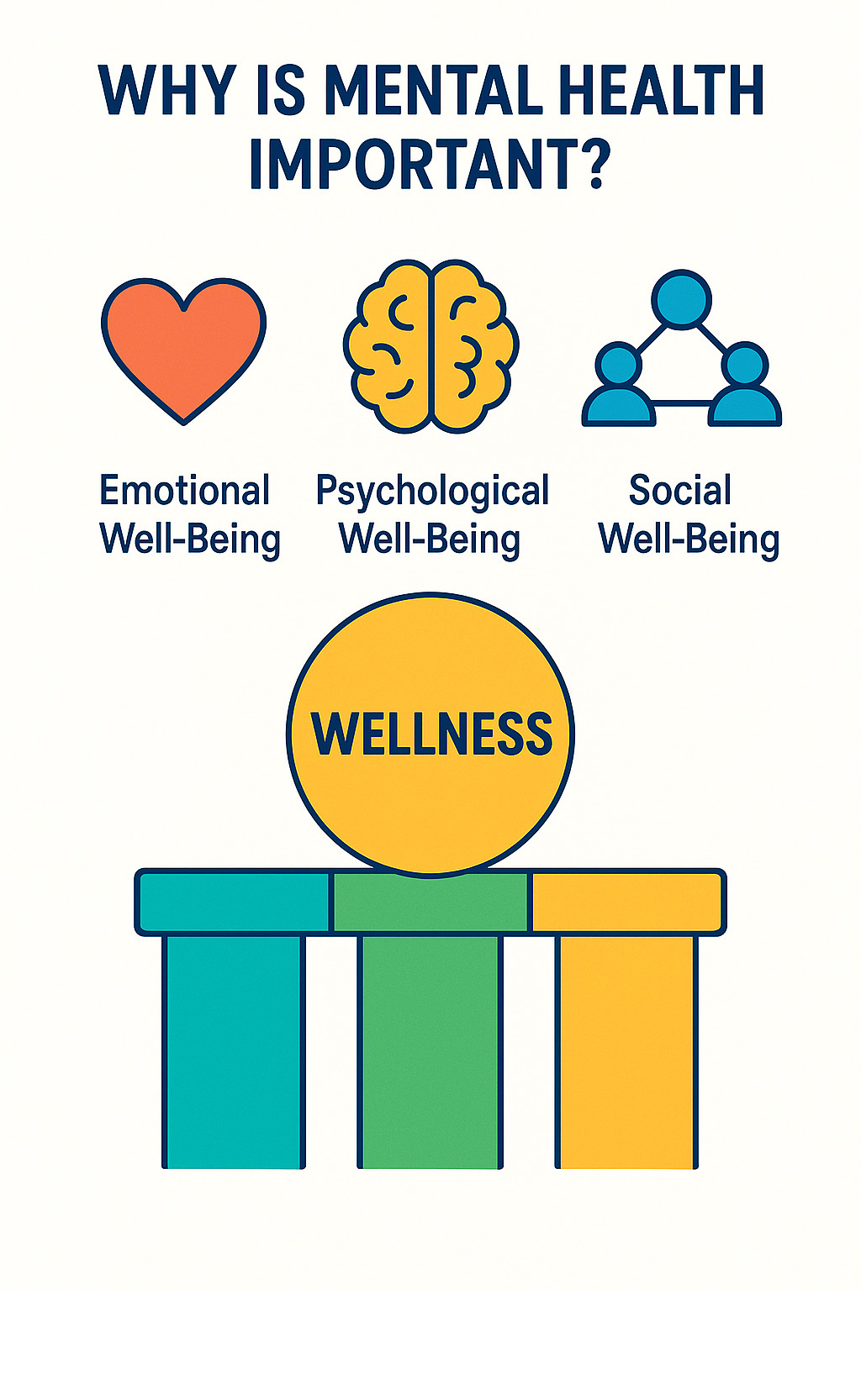Why Mental Health is Just as Important as Physical Health
Why is mental health important? It’s crucial because it affects every aspect of life—from thoughts and feelings to how you handle stress, relate to others, and make decisions. Mental health is the foundation for physical health, relationships, productivity, and overall quality of life.
Here are the key reasons mental health matters:
- Physical Health Impact: Poor mental health increases risk of heart disease, diabetes, and stroke
- Cognitive Function: Affects memory, decision-making, and problem-solving abilities
- Stress Resilience: Builds coping skills to handle life’s challenges
- Relationship Quality: Enables healthy communication and emotional connections
- Productivity: Improves work performance and goal achievement
- Life Satisfaction: Creates a foundation for happiness and fulfillment
As psychiatrist Dr. Karen Jacobs notes, “Unfortunately, mental illness still comes with a stigma in our society and it leads to people not seeking the help they need.” This stigma prevents many from addressing concerns that could significantly improve their well-being.
Mental health has three key components: emotional well-being (managing feelings), psychological well-being (cognitive function), and social well-being (relationships). Unlike mental illness—a diagnosable condition—mental health exists on a spectrum that everyone experiences.
The mind-body connection means your mental state directly impacts your physical health. Prioritizing mental wellness alongside physical care is a holistic approach that supports your glow from the inside out.

Quick why is mental health important terms:
What is Mental Health? (And How Is It Different from Mental Illness?)
Mental health is more than the absence of mental illness. It’s your overall psychological well-being, encompassing your emotions, cognitive function, and social connections.
Like a house’s foundation, your mental health supports everything: how you handle stress, make decisions, and build relationships. It influences your thoughts, feelings, and actions throughout your life.
Good mental health isn’t just about surviving challenges, but thriving. It allows you to cope with stress, work productively, contribute to your community, and realize your potential.
Mental illness, on the other hand, refers to specific, diagnosable conditions that significantly impact thought, feeling, or behavior. These conditions, like depression or anxiety disorders, can be mild or severe and temporary or long-lasting.
A common misconception is that poor mental health equals mental illness. You can experience periods of stress or grief that affect your mental health without having a diagnosable condition.
Understanding why is mental health important begins with recognizing that everyone has mental health, just like physical health. It naturally fluctuates, with good days and bad, as part of the human experience.
The stigma around mental health, particularly mental illness, often prevents people from seeking professional support, causing them to suffer in silence.
| Feature | Mental Health | Mental Illness |
|---|---|---|
| Nature | A state of well-being, exists on a continuum | A diagnosable condition affecting thinking, mood, or behavior |
| Universality | Everyone has it – can be good, fair, or poor | Not everyone has one – requires specific diagnosis |
| Focus | Overall functioning and well-being | Clinical symptoms requiring treatment |
| Example | Feeling stressed after a tough week but bouncing back | Persistent symptoms that interfere with daily functioning |
Think of it this way: a bad day isn’t depression, just as a headache isn’t a brain tumor. However, if symptoms like persistent sadness and loss of interest last for weeks and interfere with daily life, it may signal a more serious issue requiring professional attention.
Understanding this distinction opens up conversations about mental wellness for everyone. You don’t need a diagnosis to benefit from prioritizing your mental health, just as you don’t need to be sick to exercise or eat well.
For deeper insights into this topic, check out resources like Mental Health: What’s Normal, What’s Not from the Mayo Clinic, or explore our comprehensive guide on Define Mental Health for more practical information.
6 Reasons Why is Mental Health Important for Your Overall Well-being

We often focus on visible aspects of health, but an invisible force – our mental well-being – is the foundation supporting everything else. Why is mental health important? Like the roots of a tree, it allows us to grow strong, weather storms, and flourish. Nurturing your mental health is essential for a vibrant life. Here are six key reasons why.
1. It Directly Impacts Your Physical Health
The mind-body connection is a scientific reality. When mental health suffers, your body can show it through headaches, fatigue, or poor sleep. Chronic stress weakens the immune system and increases the risk for heart disease, stroke, and type 2 diabetes. The American Heart Association even considers depression as a risk factor for heart disease. The link is a two-way street, as chronic physical illness can also harm mental health.
Prioritizing mental wellness protects your physical vitality. It improves sleep (see our Beauty Sleep Tips), balances your stress response, and helps your body thrive. This holistic approach, which we detail in Holistic Wellness: The Secret to Long-Lasting Beauty, is key to a natural glow.
2. It Governs Your Thoughts and Decisions
Your mental health is the control center for your cognitive function, affecting memory, problem-solving, and decision-making. When you’re anxious or overwhelmed, your clarity of thought can become clouded, making even simple choices difficult. Conversely, good mental health promotes sharp thinking and confident decisions. It improves self-perception and boosts productivity by helping you focus and adapt. This practical link is a key reason why is mental health important, empowering you to steer life with confidence. Learn more in our guide on Mental Health and Wellness.
3. It Builds Resilience to Life’s Stresses
Life is full of challenges. Your mental health provides the coping skills and emotional regulation to steer them. Resilience – the ability to bounce back from adversity – is rooted in mental well-being. A strong mental state helps you process difficult emotions, adapt to change, and maintain a positive outlook. It acts as an emotional immune system, giving you the tools to handle stress effectively. Healthy self-esteem guides you through setbacks, helping you view them as growth opportunities. This resilience prevents burnout and allows you to maintain your sense of self during tough times. Learn more in our Emotional Health guide and see it in action in From Burnout to Balance: One Woman’s Journey to Holistic Living.
4. It’s the Foundation of Healthy Relationships
Our mental health directly impacts our ability to form and maintain healthy relationships. Strong mental well-being equips you with effective communication skills, empathy, and the ability to set boundaries. It allows for clear expression, active listening, and positive social interactions. In contrast, poor mental health can lead to social isolation and conflict. Building supportive relationships is both a result of and a contributor to good mental health, fostering a sense of belonging. The NIH social health toolkit provides resources for this, and you can find more in our Wellness and Self-Care guides.
5. It Boosts Productivity and Helps You Reach Your Potential
Mental health is linked to your ability to achieve goals. A clear, stable mind allows for focus and concentration. The impact of poor mental health is significant: globally, 12 billion working days are lost annually to anxiety and depression. Challenges like low energy, poor concentration, and lack of motivation hinder performance. There’s also a financial impact, as mental distress can affect earnings and financial management. When your mental health is strong, you can realize your potential and make meaningful contributions. You can achieve goals and feel a sense of accomplishment. Supporting your mental well-being, as discussed in Why Self-Care Is Important, is an investment in your success.
6. It Defines Your Overall Quality of Life
Your mental health underpins your entire quality of life. It’s what allows you to find happiness, life satisfaction, and a sense of purpose. With strong mental health, you can engage fully with the world, pursue passions, and find joy in daily activities. Without it, life can lose its luster, and daily functioning becomes compromised. Mental well-being is the foundation for a good, balanced life, allowing you to live authentically. For a deeper dive, explore The Ultimate Guide to Wellness and Well-Being. Understanding why is mental health important is the first step. When you nurture your mind, you invest in your overall health, relationships, and future happiness.
Key Factors That Influence Your Mental State
Like physical health, mental health is influenced by a complex mix of factors. Understanding these influences empowers us to make supportive choices and recognize when we need extra help. Even when facing challenges, we can cultivate protective factors to help us thrive.

Positive Influences
We can actively nurture our mental health through several positive factors. Supportive relationships with family and friends provide a safety net and sense of belonging, boosting resilience. A healthy lifestyle is also fundamental. This includes regular physical activity to boost mood, a balanced diet to fuel the brain, and quality sleep for emotional processing. Positive social interactions, like engaging with your community, create a sense of purpose. Finally, living and working in safe neighborhoods and supportive environments reduces chronic stress, allowing our minds to focus on growth. These elements build a strong foundation for mental resilience, as detailed in our Wellness Lifestyle Tips.
Negative Influences
Understanding why is mental health important also means recognizing negative influences. Biological factors like genetics can create predispositions to certain conditions. Life experiences, especially trauma or abuse, can have lasting impacts that may require professional support to heal. Social isolation and loneliness are also serious threats to well-being. Chronic stress from work, finances, or caregiving can deplete mental resources, while poverty and discrimination add further strain. Broader events, like the recent pandemic which increased global anxiety and depression by 25%, also play a role. By understanding these influences, we can better strengthen positive factors and develop coping strategies for challenges.
Practical Steps to Nurture Your Mental Health
Understanding why is mental health important is the first step; taking action is the next. Our minds need consistent care, just like our bodies. Small, intentional actions can create a ripple effect, changing our well-being. Mental health care is a daily practice of gentle rituals, and you don’t need a lot of time or expensive tools to make a difference.

Everyday Self-Care and Wellness Practices
Quality sleep is the foundation of mental wellness. Aim for 7-9 hours, as sleep is when your brain processes emotions and consolidates memories, making daily challenges more manageable.
Movement is medicine for the mind. Even a 10-minute walk can reduce anxiety by releasing mood-boosting endorphins.
Mindfulness and meditation teach emotional regulation and reduce stress. For more, explore The Power of Breathwork for Wellness and Inner Glow.
Journaling offers a safe space to process emotions and gain clarity on your thought patterns.
Engaging in hobbies you enjoy is essential for a sense of purpose and accomplishment.
Gratitude practice can shift your focus to the positive aspects of your life.
Connecting with nature has profound effects on mental health, reducing stress and improving mood.
Healthy eating provides the nutrients your brain needs for stable moods and optimal function.
Even 5-minute wellness activities can make a difference:
- Practice deep breathing for 1 minute
- Write down three things you’re grateful for
- Do a 5-minute guided meditation
- Stretch your body
- Step outside for fresh air
These small moments of self-care build resilience. For more ideas, check out Simple Self-Care for Therapists and Mindful Skincare Practices.
Understanding why is mental health important for seeking help
While self-care is vital, professional support is sometimes necessary. Recognizing when to seek help is a sign of strength, not weakness. It’s important to monitor your mental health because early intervention can prevent struggles from escalating.
Warning signs include changes in sleep or appetite, withdrawal from activities, persistent low energy, unexplained aches, or feelings of helplessness. More serious signs include severe mood swings, intrusive thoughts, difficulty with daily tasks, or thoughts of self-harm. If you notice these, seek professional help.
Start with your primary care provider, who can offer referrals to specialists like therapists or psychiatrists. Effective treatments, including talk therapy and medication, are available. As Dr. Karen Jacobs advises, “Start out by being honest. First with yourself, then with your healthcare provider.”
Early detection and treatment are key to recovery. Seeking help is an act of self-love. For more guidance, explore our article on How to Improve Mental Health or resources like MedlinePlus: How to Improve Mental Health.
Frequently Asked Questions about Mental Health
You’re not alone in having questions about mental health. In fact, curiosity about this topic shows you’re taking an important step toward understanding why is mental health important for everyone. Let’s address some of the most common questions we hear.
How common are mental health conditions?
You are not alone in your struggles. Mental health conditions are incredibly common, affecting roughly 1 in 5 adults and 1 in 8 people worldwide annually. This means you or someone you know has likely been affected. Anxiety disorders, for example, are among the most prevalent conditions, yet many who experience them don’t seek treatment. This treatment gap is often due to stigma or lack of awareness. These conditions affect people from all walks of life, and understanding their prevalence helps normalize the conversation about seeking help. For more statistics, you can explore resources like the NIMH statistics on mental illness.
Can my mental health change over time?
Absolutely. Your mental health is not static; it fluctuates throughout your life in response to various factors. Life events like managing a chronic illness, financial stress, or major transitions can strain your mental resources. Conversely, positive actions like starting therapy, building strong relationships, or developing healthy coping strategies can lead to significant improvements. Mental health has a great capacity for change and growth. A current struggle does not define your future, as recovery is possible with the right support and tools. For more on this, see the CDC information on emotional well-being.
What is the first step if I think I have a mental health problem?
Taking the first step is simpler than it seems. As Dr. Karen Jacobs advises, “Start out by being honest. First with yourself, then with your healthcare provider.” Self-awareness is key: notice changes in your feelings, sleep, or interests without judgment. Acknowledging these is an act of self-care. Next, talk to someone you trust, like a friend or family member. Sharing can provide relief and perspective. Your primary care provider is another excellent resource. They can rule out physical causes and refer you to specialists. Seeking help is a sign of strength and an investment in your quality of life. For ideas, explore our guide on Mental Health Activities. The journey begins with acknowledging you deserve to feel better.
Conclusion: Accept a Holistic Approach to Your Well-being
The answer to why is mental health important is clear: it’s the foundation for a life worth living. Your mental well-being influences your decisions, relationships, and physical health. This is the core of holistic wellness.
At Beyond Beauty Lab, we believe true beauty begins within, by nurturing your mind, body, and spirit in harmony. Prioritizing mental health creates the conditions for genuine vitality to shine through. It’s the foundation that allows you to handle stress, love deeply, and pursue your dreams.
We encourage you to make self-care a non-negotiable routine and to seek support without hesitation—it’s a sign of strength. By talking openly, we can break down the stigma and build a community where everyone thrives.
Your journey to holistic wellness is ongoing, and every small step is an investment in yourself. We’re here to support you. Explore our holistic wellness resources and find more ways to nurture your inner glow. When you feel good on the inside, that radiance touches everything.







